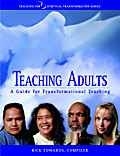Fundamental Life Questions
 I wrote the following article with Dr. Ross McLaren while I was the Adult Sunday School Director at LifeWay Christian Resources. It was published in a leader training book we produced for Bible teachers of adults called Teaching Adults: A Guide for Transformational Teaching. The book is still available, but I doubt if LifeWay is still referencing it in any way. Still, I believe the content of this article is relevant and reflects how people develop a unique worldview. This article is actually just a small piece of a longer chapter. Other segments will be posted as separate articles. And yes, I got permission to use this content for personal purposes. 🙂
I wrote the following article with Dr. Ross McLaren while I was the Adult Sunday School Director at LifeWay Christian Resources. It was published in a leader training book we produced for Bible teachers of adults called Teaching Adults: A Guide for Transformational Teaching. The book is still available, but I doubt if LifeWay is still referencing it in any way. Still, I believe the content of this article is relevant and reflects how people develop a unique worldview. This article is actually just a small piece of a longer chapter. Other segments will be posted as separate articles. And yes, I got permission to use this content for personal purposes. 🙂
Fundamental Life Questions
All people everywhere experience the passing of time. This is a universal experience. Not all people view time in the same way. Some people view time as a line moving from the beginning to the end. Others view it as a cycle. Regardless of how they perceive time in history, all people recognize the movement of time. Consequently, all people have a memory of the past, a consciousness of the present and some anticipation of the future. This is why all people have a “story.” Each person’s story will explain and determine his or her worldview.
When understood this way, it becomes apparent that each person’s story and subsequent worldview is shaped by how he or she answers certain Fundamental life Questions. The question, Where did I come from? seeks to define the person’s “prologue.” What brought the individual to this particular point in the movement of time? The question, Where do I fit in? seeks to define the person’s “story” or current situation. How we perceive our place in the world is defined by our relationship to people, places and events in the world around us. The question, Where am I going? Seeks to define the person’s “epilogue.” It tries to anticipate the future and how it will impact our lives.
In identifying these questions, keep two cautions in mind. First, Fundamental Life Questions may never be consciously articulated by an individual or a social group. Nevertheless, how one answers these questions—or what answers a person assumes to these questions—reveals the essence of his or her worldview.
Second, the forms in which the Fundamental Life Questions are expressed are temporally and culturally determined. That is, the Fundamental Life Questions may be asked in any number of ways or forms depending on one’s language, place and time in history, socio-economic level or background. Hence, what appears to be two different questions, with investigation, may prove to be alternative or representative forms of the same Fundamental Life Question.
